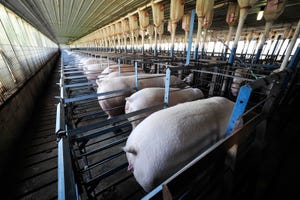On hiatus for the last couple of years, live swine exports to China are set to resume, according to the National Swine Registry (NSR)
March 11, 2011

On hiatus for the last couple of years, live swine exports to China are set to resume, according to the National Swine Registry (NSR).
China has been closed to U.S. swine since April 2009, following the discovery of the H1N1 virus in humans in the United States. Exports to China could resume pending H1N1 testing.
Officials of the U.S. Department of Agriculture, Animal and Plant Health Inspection Service, Veterinary Services requested acceptance of temporary testing from Chinese authorities in order to resume exports. Earlier this week, the Chinese Administration of Quality Supervision, Inspection and Quarantine responded in a letter to USDA indicating agreement to temporary health testing for H1N1 and, based on this protocol, trade for U.S.-origin live swine can resume.
“This is a tremendous announcement for our purebred swine breeders whose primary export market, before 2009, was China,” responds NSR CEO Darrell Anderson. He notes the loss of access to the Chinese market over the past 22 months has been devastating to NSR’s exporting members.
In 2008, purebred swine exporters, collectively marketing under NSR’s America’s Best Genetics program, shipped a record 7,200 head of swine to China, valued at $12 million.
Tony Clayton, exporter and owner of Clayton Agri-Marketing, Inc., works closely with the NSR in facilitating many export shipments. “We were on pace to set new records in 2009, before the frenzy broke, and trends would have likely continued throughout 2010,” Clayton says.
While China began accepting pork exports from the United States starting May 1, 2010, live animal exports were still banned. As of December 2010, Clayton estimated the accumulative losses to breeders and the export industry at more than $30 million.
Compounding the live swine trade issue was unrelated poultry trade conflicts between the United States and China, stalling negotiations. “Unfortunately, for an industry such as purebred swine breeding stock, the big-picture political crossfire that exists between countries in general overshadowed the relevance and need for releasing the export ban,” says Anderson, noting the agreement for H1N1 testing was also a result of political necessity.
H1N1 testing for live swine is not science-based. But other major swine exporting countries such as Canada and the Netherlands had agreed and conducted testing during the past year in order to access China, putting the United States at a competitive disadvantage.
“We were watching some of our most important partners in China being forced to fill their swine needs with animals from Canada or elsewhere,” Anderson says. “In order to level the playing field, we knew the United States would have to implement testing as well in order to remain viable.”
Anderson says many NSR members who have swine breeding stock orders pending with clients in China hope to resume shipping live animals by early this summer.
“We have worked for years to develop strong relationships with our Chinese counterparts who have aggressively sought after and purchased U.S. swine genetics for years,” Anderson says. “To have this trade limited has been frustrating for both our Chinese clients and our own members; to have it open is a win for everyone.”
To learn more about NSR, call (765) 463-3594 or visit www.nationalswine.com.
You May Also Like



